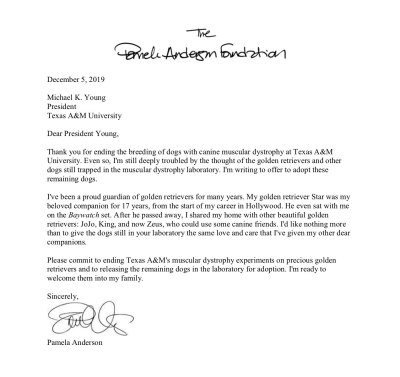You know that classic Christmas hit, “All I Want for Christmas Is You”? Well, for Pamela Anderson, the star of Home Improvement, her holiday wish is a little different. Instead of presents under the tree, she's hoping to welcome some furry friends into her home this Christmas. In her latest move as an animal rights advocate, Pamela has written a heartfelt letter to Texas A&M University, asking them to release the dogs they're currently using for testing.
At 52 years old, Pamela is no stranger to standing up for animals in need. In a statement exclusively shared with Closer Weekly, she said, "I’ve always opened my home to animals in need and hope to welcome these dogs soon. They’re at the top of my Christmas list." This isn't just a casual wish—it's a genuine plea from someone who has dedicated a significant part of her life to animal rights activism.
Pamela's Letter to Texas A&M University
Her letter, which Closer Weekly exclusively revealed on Thursday, December 5, is addressed to Michael K. Young, the president of Texas A&M University. It's a powerful message filled with empathy and a deep sense of responsibility toward these animals. Here's what she wrote:
Read also:Stephanie Soo And Her Mysterious Love Life Everything You Need To Know
“Thank you for ending the breeding of dogs with canine muscular dystrophy at Texas A&M University. Even so, I’m still deeply troubled by the thought of the golden retrievers and other dogs still trapped in the muscular dystrophy laboratory. I’m writing to offer to adopt these remaining dogs.
I’ve been a proud guardian of golden retrievers for many years. My golden retriever Star was my beloved companion for 17 years, from the start of my career in Hollywood. He even sat with me on the Baywatch set. After he passed away, I shared my home with other beautiful golden retrievers: JoJo, King, and now Zeus, who could use some canine friends. I’d like nothing more than to give the dogs still in your laboratory the same love and care that I’ve given my other dear companions.
Please commit to ending Texas A&M’s muscular dystrophy experiments on precious golden retrievers and to releasing the remaining dogs in the laboratory for adoption. I’m ready to welcome them into my family.”
It's a moving letter that highlights not just her commitment to animal rights but also her personal connection to these animals.
See the Letter Here

What Texas A&M Has Been Doing
According to People for the Ethical Treatment of Animals (PETA), Texas A&M University has been breeding golden retrievers and other types of dogs to develop muscular dystrophy. This allows researchers to run tests on them in hopes of finding a cure for humans. Back in March 2017, PETA released a video showing the harsh realities these beloved creatures face, prompting celebrities like Lily Tomlin and Paul McCartney to speak out against such practices.
By September 2019, Texas A&M University promised to stop breeding golden retrievers and other dogs with muscular dystrophy. However, the experiments haven't completely ceased. A PETA spokesperson told Closer Weekly that approximately 35-40 canines are still enduring laboratory conditions. This is why Pamela, a long-time critic of the commercial fur industry and proud vegan, is stepping up to offer these animals a loving home.
Read also:Teach Me First Honeytoon A Sweet Blend Of Learning And Fun
For more information, visit PETA.org.
For more exclusive content, sign up for our Closer Weekly newsletter!


